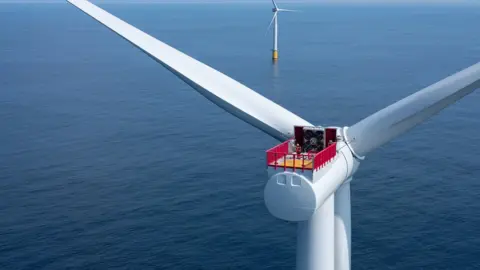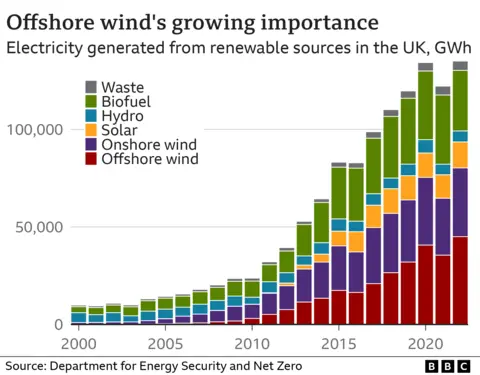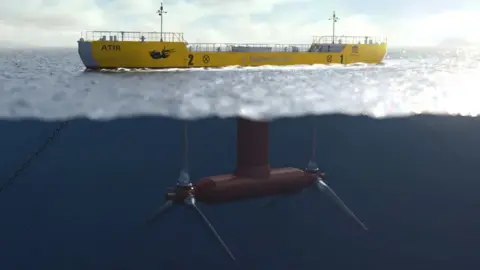First floating wind farm in Wales delayed over funding
 Oeyvind Gravaas / Equinor
Oeyvind Gravaas / EquinorPlans for Wales' first floating wind farm will be delayed by one year as UK government funding is too low, the firm behind the plans says.
Blue Gem Wind did not bid for a UK government contract, a decision which industry voices said was a "huge wake-up call" for Westminster.
It was claimed that the Erebus offshore wind farm could establish an industry that creates up to 10,000 jobs.
The UK government said inflation had "presented challenges".
The UK government's annual auction invites companies to bid to develop renewable energy projects and contracts to supply the UK grid with electricity.
The contracts offered involve a set price for the electricity generated, sometimes referred to as an energy tariff.
The scheme aims to offer contracts on a 15-year term to stabilise traditionally volatile energy prices, while allowing developers to secure the financing and private investment they need to build the projects.
But Blue Gem Wind said a huge increase in costs meant the money on offer was not enough to make it worthwhile to bid.
Erebus, which is planned to be located 40km (25 miles) off the coast of Pembrokeshire, forms a central plank of the Welsh government's renewable energy targets.
A Blue Gem Wind spokesperson said: "Well-known global factors that have significantly increased supply chain costs in the last 18 months, combined with deploying floating technology in a region that has not previously supported offshore wind, have created a challenging environment."
The company said it was still hopeful that it could press ahead with the plans.
"A potential delivery strategy for Erebus is currently being developed which will have to fully consider future plans," the firm said, adding that it would continue to work with the UK government.
The UK government said the lack of bids for new offshore wind projects was "in line with similar results in countries including Germany and Spain" and that it was a result of "the global rise in inflation and the impact on supply chains which presented challenges for projects participating in this round".
"However, the industry remains a British success story, with the government committed to its ambition of securing 50GW of offshore wind capacity and 5GW of floating offshore wind by 2030," the UK government spokesperson added.

The industry body RenewableUK Cymru said it was "incredibly disappointed" at the news and said the industry had warned the government that the price being offered was not good enough.
Director of RenewableUK Cymru Jess Hooper said Erebus was "critically important not only to Wales and the wider South West region, but also for the UK government's own floating offshore wind targets".
Erebus would be the third floating offshore wind farm in the UK, but the estimated 100 megawatts of energy which could be generated by the project is more than double the others.
While traditional offshore wind turbines are built into the sea bed with fixed foundations, floating turbines sit on large floating steel structures which are then tethered to the seabed.
This allows the turbines to be placed further out at sea in locations with higher winds.
Tidal stream
 Illustration / Magallanes Renovables
Illustration / Magallanes Renovables While there are now big questions about offshore wind, there is some good news for Wales about another burgeoning technology - tidal stream.
Four small-scale projects on Anglesey have been given the go-ahead to install this new technology, which produces energy from tidal currents.
Tidal stream is predictable and consistent and already provides energy to the grid in other parts of the UK.
It is hoped that the four projects on Anglesey - whilst on a significantly smaller scale than Erebus - will lead to larger projects and, in turn, economic and environmental benefits.
